Checking Out the Varied Applications and Benefits of Polymers in Different Industries
Polymers, with their varied range of buildings and performances, have actually come to be crucial in different industries, each enjoying special advantages from their application. From improving safety and performance in the vehicle market to revolutionizing clinical tools in the medical care industry, polymers play a critical function.
Automotive Market Applications
Polymers play an essential role in boosting the efficiency and toughness of numerous elements within the auto field. One prominent use of polymers in the automobile market is in the production of light-weight parts.

Health Care Market Advantages
In different healthcare applications, the benefits of using polymers are widely recognized for their varied series of helpful residential properties. Polymers play a vital role in the healthcare industry because of their adaptability, biocompatibility, and cost-effectiveness. Among the main advantages of polymers in health care is their ability to be customized to specific requirements, such as versatility, sturdiness, and biodegradability, making them excellent for a vast array of clinical applications.
Polymer-based products are extensively utilized in medical devices, such as catheters, implants, prosthetics, and medicine distribution systems, as a result of their biocompatibility and capability to simulate natural cells. These products can decrease the risk of allergies or denials, boosting client safety and security and outcomes. Furthermore, polymers are lightweight, making them appropriate for wearable clinical tools and making sure individual convenience.
In addition, polymers make it possible for the development of ingenious therapy approaches, such as hydrogels for tissue design and nanocomposites for targeted medicine delivery. Their simplicity of handling and sterilization makes them vital for maintaining high standards of health in medical care settings. On the whole, the varied advantages of polymers contribute substantially to developments in clinical innovation and patient care.
Environmental Advantages of Polymers

In addition, polymers can add to power cost savings because of their light-weight nature. In markets such as transportation, light-weight polymer materials can help in reducing fuel usage and greenhouse gas exhausts. In addition, polymers can allow the growth of energy-efficient items such as insulation products that improve energy conservation in buildings.
Moreover, polymers play an essential role in decreasing water pollution. As an example, making use of polymer-based filtering systems can effectively eliminate toxins and pollutants from wastewater, safeguarding water resources and environments. Overall, the environmental benefits of polymers make them important assets in promoting sustainability and green methods throughout different industries.
Polymers in Electronics and Technology
Considering the enhancing need for ingenious and sustainable remedies in modern sectors, the combination of go to this site innovative polymer technologies in the realm of electronics and modern technology has actually arised as an essential method for driving efficiency and efficiency. Polymers have reinvented the electronics market by making it possible for the production of lighter, more adaptable, and resilient digital tools. From smart devices to clinical tools, polymers play an important duty in boosting product layout and performance.
One considerable advantage of polymers in electronics is their shielding properties, which help protect delicate electronic parts from environmental factors and electric disturbance. Additionally, polymers are important in the advancement of adaptable displays, wearable modern technology, and published electronic devices, using endless opportunities for creating smart and interconnected tools.
Additionally, the use of polymers in digital product packaging has actually caused developments in miniaturization and thermal administration, boosting the general efficiency and reliability of digital systems. As modern technology proceeds to evolve, the convenience and versatility of polymers will unquestionably drive additionally technology in the electronic devices industry, visit this website shaping the future of innovation.
Role of Polymers in Building And Construction and Infrastructure
The assimilation of sophisticated polymer materials in building and facilities projects has actually transformed the way structures are created and integrated in modern times. Polymers supply numerous advantages in the construction market due to their adaptability, sturdiness, and cost-effectiveness. One essential role of polymers in building and construction is their usage in layers and sealants, supplying defense versus ecological factors such as wetness, UV radiation, and rust. In addition, polymers are used in the manufacturing of lightweight and high-strength composite products, improving the structural integrity of structures while minimizing total weight.
Furthermore, polymers play an important role in sustainable building practices by allowing the growth of energy-efficient structures. Shielding products made from polymers help manage indoor temperatures, decreasing the demand for home heating and cooling systems and ultimately decreasing linked here energy consumption - Polymers.
Final Thought
To conclude, polymers play a crucial function in different sectors such as auto, medical care, ecological, electronic devices, and building. Their flexible residential or commercial properties make them valuable in creating ingenious options and products. From improving fuel effectiveness in cars to enhancing clinical gadgets, polymers supply countless benefits. In addition, their effect on decreasing waste and advertising sustainability highlights their importance in contemporary applications. The widespread use polymers demonstrates their significant contribution to advancing innovation and boosting top quality of life.